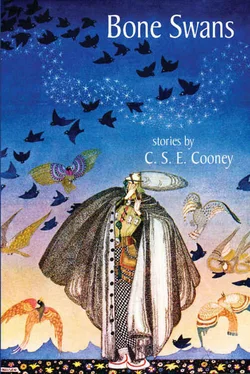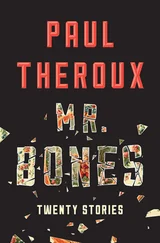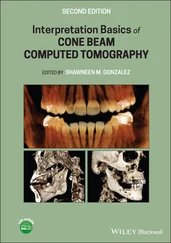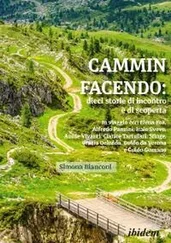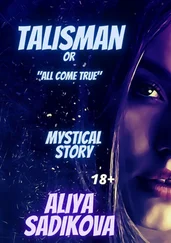This collection is dedicated to John O’Neill and Tina Jens.
Gene Wolfe: Introducing C.S.E. Cooney
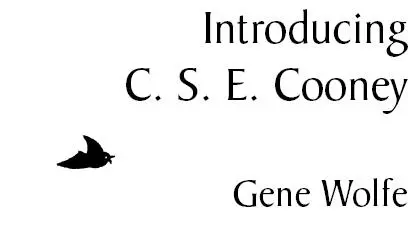
Picture me sitting in a small used-book shop with a banana cream pie on my lap. The young man reading at the lectern has given us a short-short story that is certainly publishable and has now launched upon one that that is not. We have had the poetry that suggests a poor article in Reader’s Digest cut up into uneven lengths, and the heart-wrenching personal memoir of the sister of a soldier killed overseas. And others. You know.
The readers are kept in order by Claire Cooney, a startling young blonde with a smile capable of lighting up a good sized theater. At last she reads herself, a poem that rhymes and scans and grabs you from the opening line. The hero is a disfigured corpse floating down a city sewer, and it is funny when it is not horrible. (And sometimes when it is.) She chants it, and her voice is clear and musical. I couldn’t be prouder of her if I were her father.
I met Claire when my friend Rory Cooney brought her around to see me. His daughter wrote, he explained, and he felt she had talent. Would I be willing to coach her a bit? I read some short pieces she had written and promised to do it. She was eighteen at the time.
Most writers begin by imitating some favorite writer, H. P. Lovecraft imitating Lord Dunsany for example. There’s nothing wrong with that, provided the beginner grows out of it and finds his or her own voice. If Claire began by imitating somebody, she had already grown a long way out of it at eighteen. She wrote pure Claire Cooney. (Try to define that when you’ve finished the stories in this book.)
She is in love with literature AND the theater—yes, both at the same time. She had a double major in college and has had a double major in life. She has played Rosalind in a professional production of As You Like It , and I wish I could have seen it. If there was ever a girl created by God to swagger around on stage with a broadsword pushed through the knot in her sword belt, Claire is that girl. The one time I have seen her in a play, she was a South African whore; she was good in that role, too, and gave me the impression that she would be good in any role that did not require her to die coughing up blood.
What did she learn from me? Nothing, really. There is a select type of student, rare but invaluable, who will certainly succeed if not run down by a truck. You help yourself instead of helping them, putting an arm around their shoulders and making them promise to say you taught them all they know. I have had two of those, and Claire is one. I tried. I explained to her that there is no money in poetry anymore.
She continues to write poetry anytime she feels like it. It’s all good, and some of it is great.
I explained that though writers learned to write by writing short stories, the money was in novels these days.
Claire insists she has a secret novel she is grinding away at; meanwhile she shows tourists through an aquarium, answers casting calls, and pens poems. Not to mention short stories starring cunning were-rats. And on rare occasions, she writes e-mails to me.
I explained the business of—well, never mind. You get the picture.
Also—this one actually took—I introduced her to science fiction conventions. To the best of my memory, her first was Readercon. (Always start at the top.) Claire, Rosemary, and I lived in greater Chicago in those dim, far-off days. Readercon, as you may know, is always held in or around Boston.
We drove.
It used to be that Rosemary would spell me at the wheel. By the time we drove to Boston, she was unable to walk more than a step or two and completely incapable of driving. So Claire spelled me, letting me for the first time ever ride in my own back seat. She would, I’m sure, have worn a chauffeur’s cap, had I had wit enough to obtain one.
Doubtless you know that once upon a time, the very best cars—my father remembered them—had run by steam. The chauffeur did not drive them; he stoked the fire under the boiler. Now I was the chauffeur in the original sense, stoking our fire by encouraging Claire, praising her skill at the wheel, and so forth. Giving her confidence, too, by keeping the road atlas open on my lap and explaining that soon we would leave this federal highway and enter the other interstate. Claire held our speed between fifty and fifty-five, so that our progress resembled that of a barge on a canal. I was tempted to climb out a window and ride on the roof, ducking for low bridges like the passengers in the song, but though that might have been fun, it would almost certainly have resulted in the loss of the road atlas. I remained inside.
Claire did lots of other things, too. When I was locked in an elevator on the first floor of a large motel, and Rosemary marooned in her wheelchair on the second, Claire served as go-between, running up and down the stairs to check the condition of the elevator and report to Rosemary.
When we got to Readercon, Claire discovered a coven of witches and joined at once. (“Keep Halloween in Your Heart All Year long!”) She fit right in, and before the con was over, the witches were boasting about their new member. Nobody had smartphones then, but Claire and I had brought our cell phones. Claire, I should explain, pushed Rosemary’s wheelchair from time to time and was able to accompany and assist her in the ladies’ room. On one occasion, Claire and I held a long conference by cell phone before I discovered that she was around the corner, about five short steps away.
Perhaps you feel that I have told you too much about the author in this introduction and not enough about the stories in this book. All right, let’s take up a favorite of mine, “The Big Bah-Ha.” Perhaps you know that you and I live in the Milky Way galaxy, an immense whorl of stars. You may also know that for years astronomers have wondered whether our own star’s orbiting planets were unique. Did other stars have planets, too? A few said yes and many more no. But no one actually knew; it was all guesswork.
Science fiction (and religion) sided with the minority, the scientific world in general with the majority. Without evidence, it was foolish to assume that anything existed. To assume that things as large as planets did was the height of folly.
Now we have a little hard data, and it would appear so far that planets are the rule, not the exception.
Let’s think about that. The number of stars in our galaxy is enormous, almost infinite. And yet our galaxy is only one of many. We continue to find new ones, and it may well be that their number is infinite or nearly.
Enter Claire. If there are so many galaxies, and so many stars in each of those galaxies, almost every imaginable race must also exist. What about a race similar to our clowns? A race wearing oversized shoes and rubber noses. Why, there are stranger customs right here on Earth! We know, then, what their society would be like, but what about their religion? And what if their religion were true?
God is infinite.
Life on the Sun
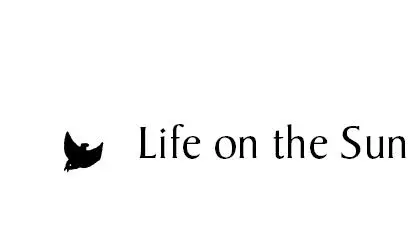
That was the day the sky went dark.
No eclipse was scheduled on the priests’ calendars to spur the fervent into declaiming the last days. No dust storm had blown up from the Bellisaar Wasteland, spinning the air into needle and amber and suffering all unwary walkers the death of a thousand cuts. No warning.
Читать дальше
